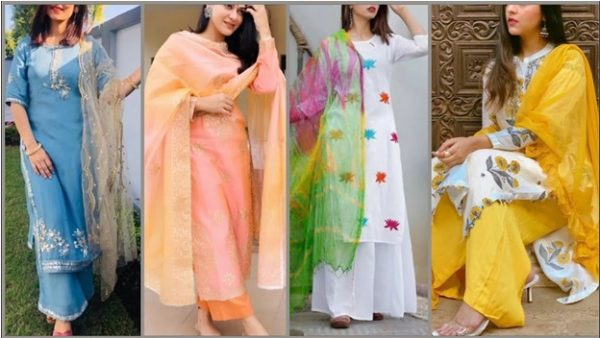The salwar suit, a quintessential staple of South Asian fashion, has evolved far beyond its traditional roots to become a global sensation.
With an array of styles, fabrics, and designs, the salwar suit offers incredible versatility, allowing wearers to adapt effortlessly to the changing seasons.
However, styling your salwar suit to suit summer’s sweltering heat or winter’s chilly breezes can be a bit of a challenge. But fret not! With a few clever choices, you can ensure that your salwar suit remains your go-to outfit, whether it’s for a summer soirée or a winter wedding.
Here’s a complete guide to navigating salwar suit fashion for every season, with a special mention of Klistel, a brand that’s been making waves in contemporary salwar design for girls.

Summer Salwar Suit Fashion: Light, Bright, and Breezy
When the sun is high and the days are long, the key to summer fashion is to keep it light and breathable. The salwar suit, with its inherently comfortable design, is perfect for summer – provided you make a few smart fabric and style choices.
- Fabric Matters: Go for Breathability
During the summer months, choose fabrics that allow your skin to breathe. Cotton is the classic choice for summer salwar suits. It’s lightweight, breathable, and has a natural cooling effect, perfect for beating the heat. Additionally, opt for mulmul (a fine, soft variety of cotton), linen, or lightweight Chanderi. These fabrics not only keep you cool but also drape beautifully, giving you an effortlessly chic look.
- Color Palettes: Embrace the Light Side
Summer is the season to play with color! Opt for light and pastel shades like mint green, powder blue, soft pink, and lavender. These hues reflect sunlight rather than absorbing it, keeping you cooler. Whites and off-whites are perennial favorites, giving a refreshing look that’s easy on the eyes and ideal for daytime wear.
You can also experiment with floral prints, geometric patterns, or delicate embroidery. Remember, the idea is to keep it minimal yet stylish. Avoid heavy embellishments that can make the fabric heavier and cause discomfort in the heat.
- Style Selection: Flow and Comfort
Loose and flowy designs are your best friends in the summer. Anarkalis, A-line cuts, or straight-cut suits with flared palazzos or loose salwars provide maximum comfort. Look for suits with three-quarter sleeves or sleeveless styles for added ventilation.
The beauty of summer styling lies in layering lightweight fabrics without feeling bulky. Think of a light, sheer dupatta with minimal embroidery or a cropped jacket over your salwar suit. It adds a fashionable edge while keeping you cool.
Winter Salwar Suit Fashion: Warm, Elegant, and Cozy
Winter fashion is all about layering and warmth, but that doesn’t mean you have to compromise on style. The salwar suit can be just as fashionable and functional in the colder months with the right choices in fabric, layering, and accessories.
- Fabric First: Opt for Warmth and Comfort
As the temperatures drop, switch to thicker fabrics that provide warmth. Velvet, wool blends, tussar silk, and brocade are excellent choices for winter salwar suits. They not only offer protection from the cold but also add a luxurious feel to your attire.
A velvet salwar suit, for example, can be both cozy and chic, making it an excellent choice for evening events. Pairing a tussar silk kameez with a woolen shawl not only keeps you warm but adds a touch of sophistication to your ensemble.
- Color Palettes: Go Dark and Deep
Winter is the perfect time to indulge in rich, deep hues. Think jewel tones like emerald green, ruby red, royal blue, and deep purple. Earthy tones like maroon, mustard, and olive green also work wonders in winter, adding warmth and richness to your look.
These deeper shades not only suit the season but also add a level of elegance that lighter colors might lack in winter settings. Don’t shy away from gold or silver embroidery or embellishments; they can add a festive sparkle to your outfit, making it perfect for winter weddings and celebrations.
- Style Selection: Structured and Layered
In winter, you can play with more structured silhouettes. Opt for full-sleeved suits, floor-length Anarkalis, or even asymmetrical hemlines that provide added coverage. Layering is key – think of a long, woolen jacket-style kameez paired with fitted churidars or a short kurti with a shawl and a high-waisted Patiala.
Accessorize with shawls or scarves in luxurious fabrics like pashmina or cashmere. A well-draped shawl can transform your look while keeping you warm. If you prefer a more contemporary look, a long, structured coat over a straight-cut salwar suit can make a bold fashion statement.
Final Styling Tips: Transition with Grace
Transitioning your salwar suit wardrobe from summer to winter doesn’t mean a complete overhaul. With a few versatile pieces and smart styling, you can adapt your favorite suits to any season. Invest in multi-seasonal fabrics like silk blends that can be layered for winter or worn alone in summer. Accessories, too, play a vital role – a light scarf for summer can be swapped for a heavier shawl in winter.
Remember, the beauty of the salwar suit lies in its adaptability and timeless appeal. By making thoughtful choices in fabric, color, and style, you can create a wardrobe that’s perfect for every season.
Whether you’re stepping out for a casual brunch in the summer or attending a festive gathering in the winter, the salwar suit, especially pieces from brands like Klistel, can help you look effortlessly stylish. So, embrace the season with confidence and let your salwar suit be a reflection of both comfort and couture.
After all, fashion is about feeling good in what you wear, and there’s nothing more comforting than a well-chosen salwar suit that fits both your body and the season.
The post Seasonal Salwar Suit Fashion: What to Wear in Summer vs. Winter appeared first on ALL FOR FASHION DESIGN.
Source: ALL FOR FASHION DESIGN https://allforfashiondesign.com/seasonal-salwar-suit-fashion-what-to-wear-in-summer-vs-winter/
First seen onhttp://allforfashiondesign.com/
No comments:
Post a Comment